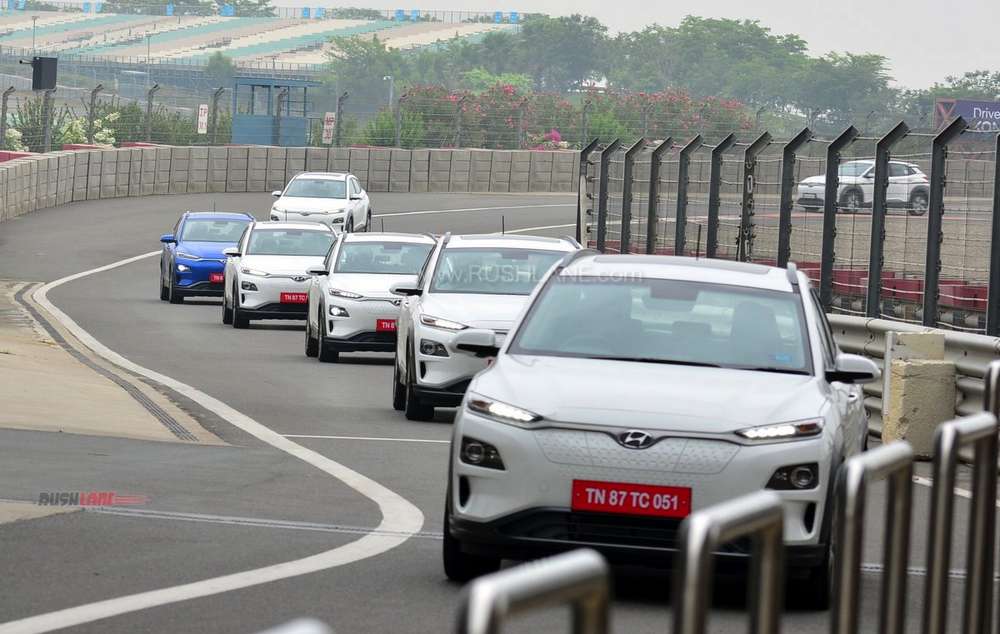
Indian auto industry is clearly going through a transition phase. Consumer choices have started to shift towards safer products and the government has started taking EVs way more seriously than ever before. However across all of this, one thing which hasn’t changed is the love for SUVs which Indian customers have. So, if you have to bring in a new product in this challenging atmosphere, what do you do as a smart OEM?
Answer: You bring in a product which does it all! Attract the subsidies/benefits of being an EV from the Government (check), ride on the SUV bandwagon (check, well … almost), a product which can set new industry benchmarks (check), cleanse customer’s conscience by having a product which has 0 emissions (check)!
This is essentially what Hyundai has done by introducing the Kona EV in India, which also is the first all-electric SUV of the country. We spent a day with the Kona at the BIC race track, and here is all that we would like you to know about the latest EV of the country!
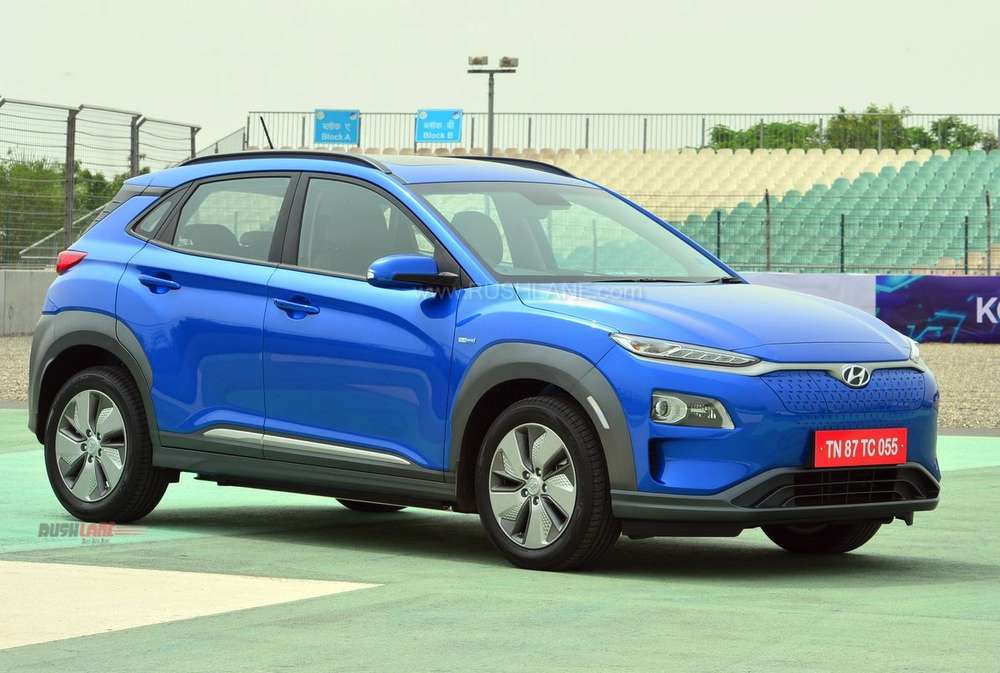
Exteriors – Time to call a spade, a spade! The Kona isn’t a Tesla or an i8. Neither does it look like a futuristic gizmo nor does it carry the conventional machoness which you expect out of a conventional SUV. At best, it looks like a cross between the i20 and the Hyundai Creta.
But, if you look at it practically, it still is the best-looking electric vehicle in the country, especially when the competition is from Mahindra’s eVerito and Tata’s Tigor Electric. The other fact is, the Kona isn’t about looks anyway. It is more about what it packs on the inside and that is where it starts to impress.
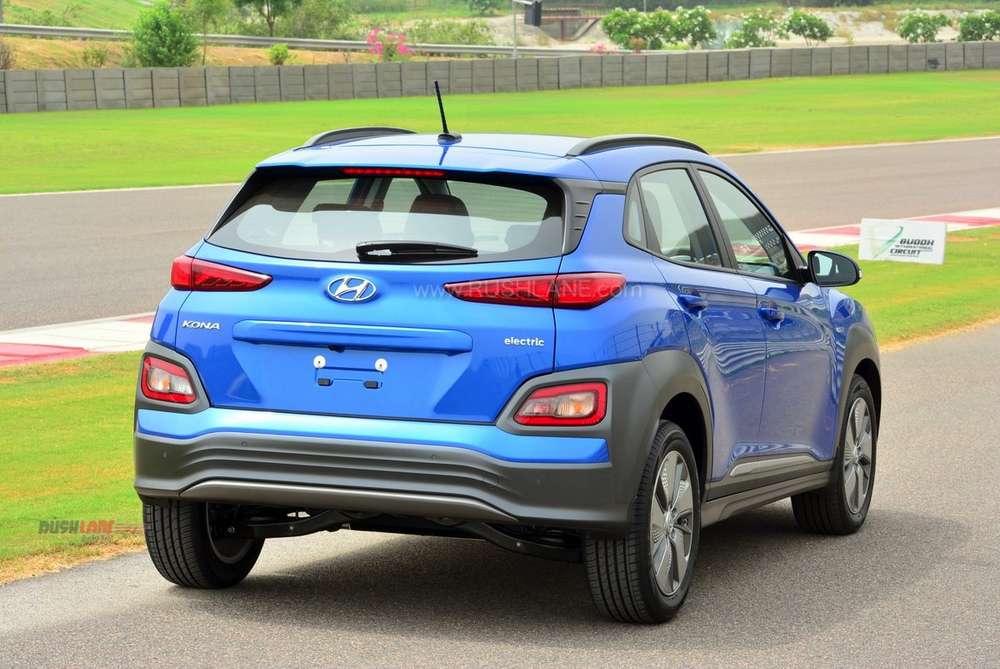
Interiors – The Kona isn’t actually an SUV, and this feel continues on the inside as well. If you were to compare it with conventional SUVs which are priced around the same price bracket, you might be disappointed as it just has enough space to qualify as a hatchback.
Seating comfort is good in the front, especially due to the leather-wrapped seats and the fact that the driver seat comes with 10-way-power adjust. Rear seats are good too, though you will wish that there was little more legroom and headroom.
However, if you look past the space bit, the car looks and feels premium. Quality of materials on the inside are top-notch, be it upholstery or plastics. The central infotainment unit (which supports Apple CarPlay and Android Auto) looks huge and chunky (it is, 17.77 cm wide), however it does look a bit out of place as it doesn’t exactly flow well with the overall design of the dashboard.
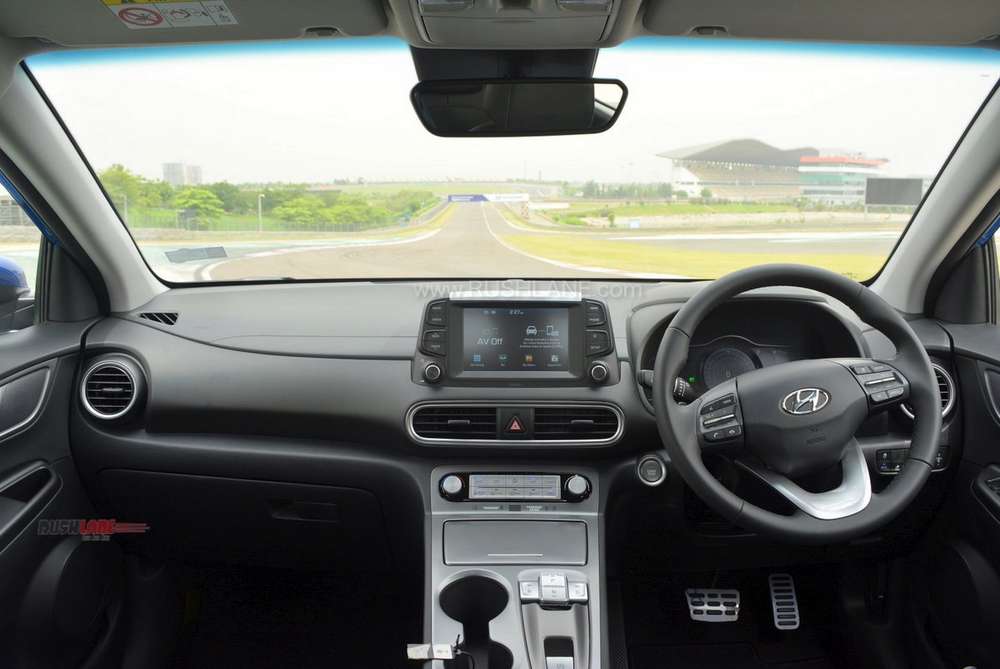
The all-digital instrument cluster does proper justice to the EV tag as it looks and feels futuristic. It provides all kind of information which you would like to know, for example, the amount of battery left, the mode you are driving the car in, odometer reading and everything else.
Feature list is solid as customers get a tonne of features, including ventilated front seats, 10-way power adjustable driver seat, FATC, smart key with push button start/stop, wireless smartphone charging, adjustable steering wheel, electric sunroof, electric parking brake etc.
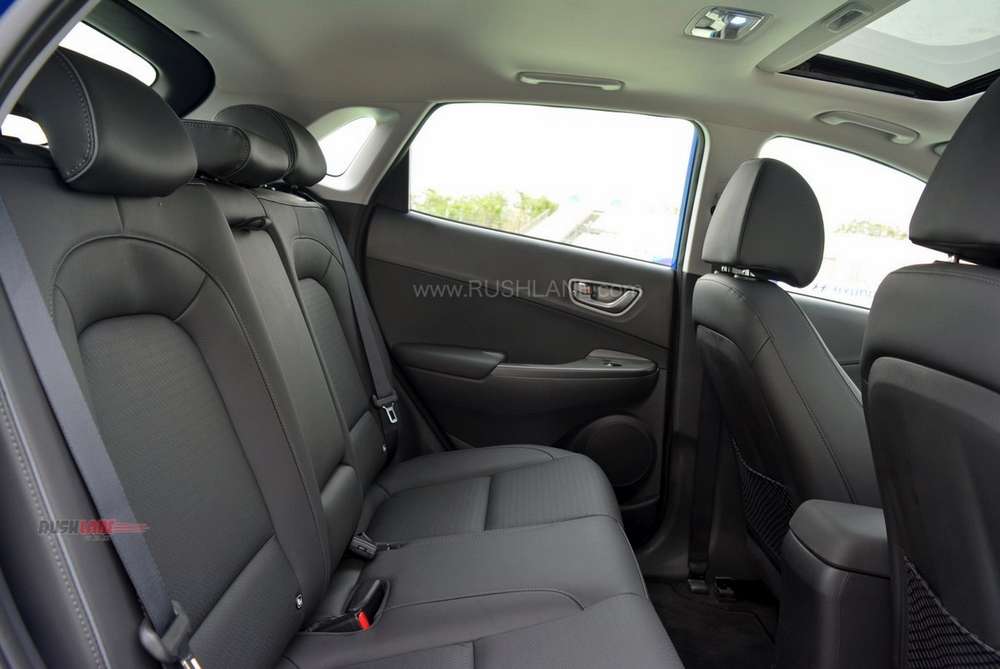
Overall feel of the cabin is a mix of premium and futuristic. Black interiors along with silver accents look good, but don’t help in making the compact cabin feel roomier. The saving grace here is the large sunroof, which can bring in some fresh air, literally.
If you were to be in the front seats, you probably won’t complain about anything, however rear passengers will crave for some additional space!
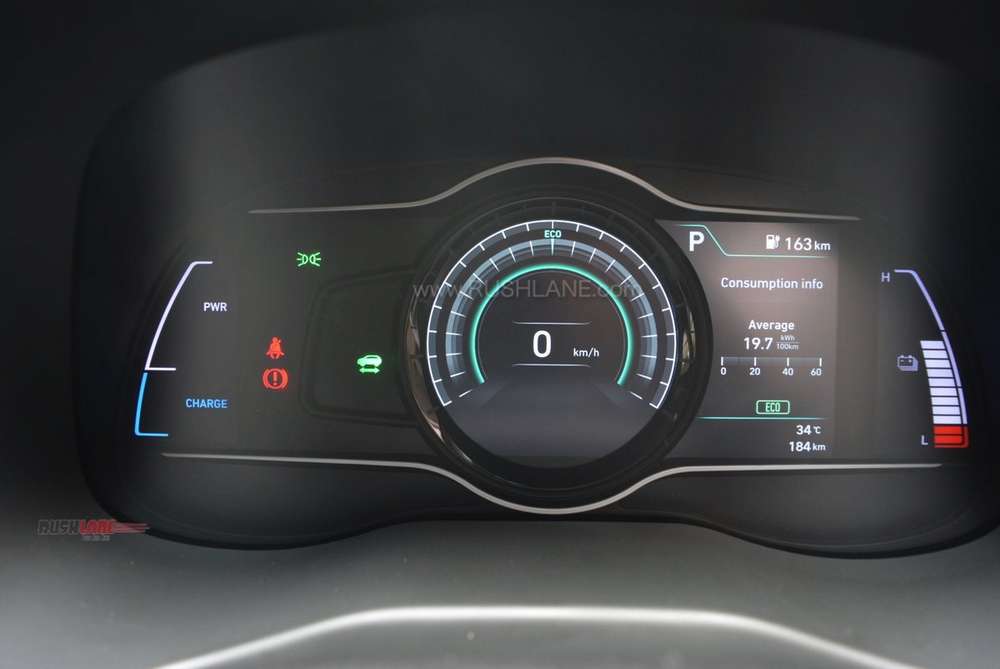
Driving Dynamics – The Kona isn’t just India’s first EV SUV, it also happens to be the first EV in the country which can actually be taken to the track to have some fun. This is essentially what Hyundai planned for us as we got to test-drive the car at the BIC.
Being an EV, the car does a good job with acceleration. Its 136ps electric motor is powerful enough to help the Kona do a 0-100 kmph in 9.7 seconds! Power comes from a high voltage 39.2 kWh lithium-ion polymer battery pack which is then delivered to the front wheels, helping the car feel like a conventional modern crossover.
Hyundai has also provided different driving modes, including Eco, Eco +, Comfort and Sport, names of which are pretty much self-explanatory as in what they do. When you are on the track, you shift to Sport and for your daily crawls, choose the Eco mode and save the planet. Braking duties are taken care of by 4 discs, and they do their job well.
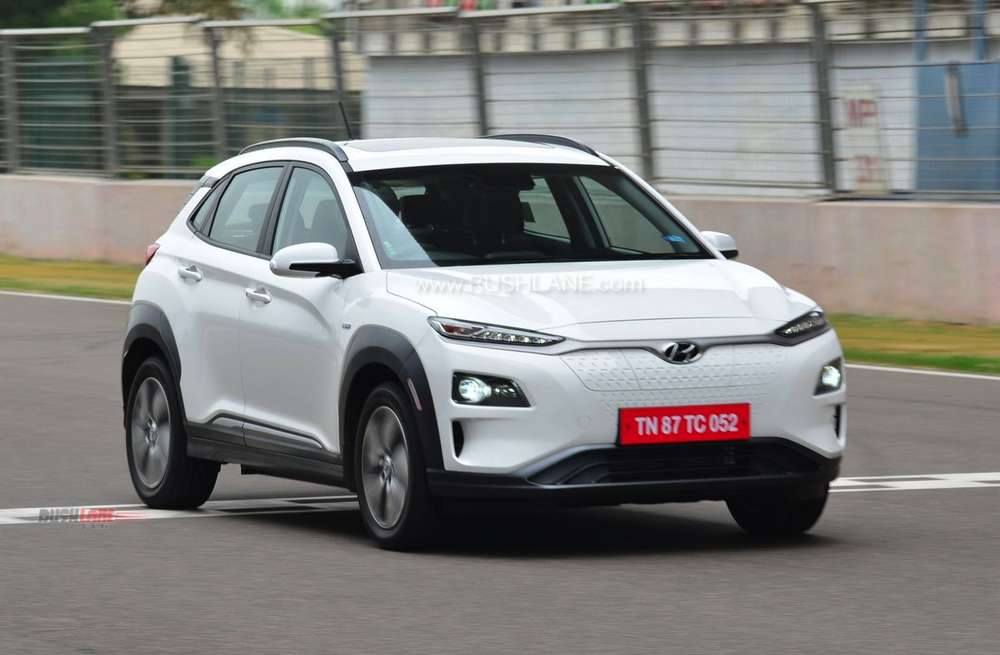
Ride & Handling – The Kona feels light to maneuver, so we can confirm that your daily office commute in the city won’t be taxing. The car behavs maturely when you throw it into corners, however, you do crave for more steering feedback.
Overall ride quality is good, but we didn’t exactly take it through pot-holes which are omnipresent on all Indian roads, especially during the monsoon. NVH levels? Sorry, there is almost no noise or vibration, thanks to the electric motor and good insulation!
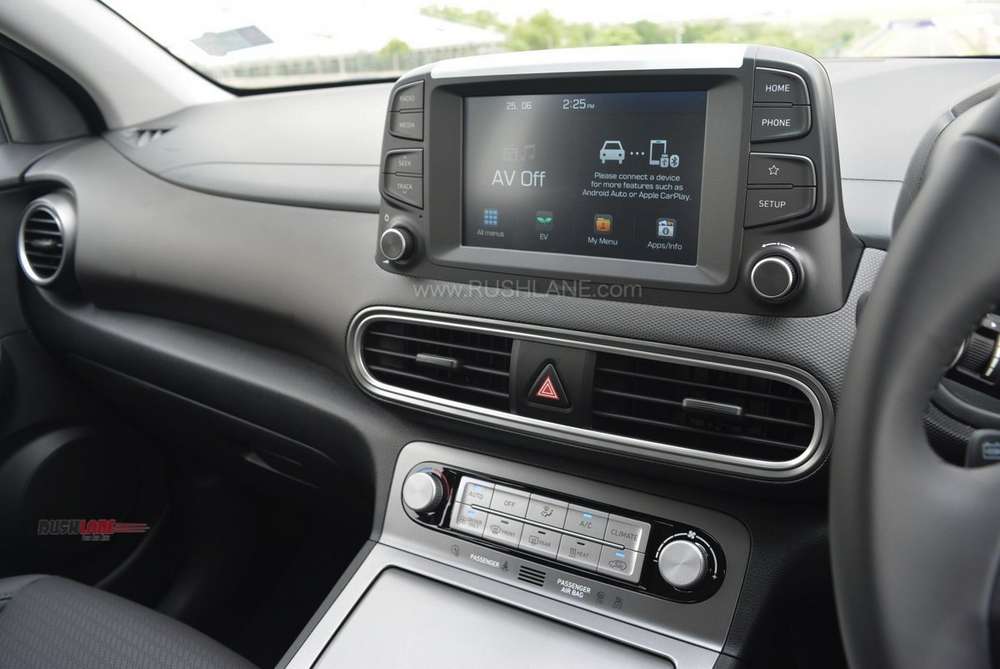
However, what we did feel was that the car wasn’t very stable beyond the 140 kmph mark. That being said, we touched those speeds on the track and as a regular user, none of the Indian highways allow us to go beyond the 100-120 kmph range, so this isn’t a deal breaker as such.
Safety – Hyundai has ensured good safety for occupants of the Kona. The electric SUV gets ABS with EBD, 6 airbags, ESC, VAM, Rear camera with guideline display, Tire pressure monitoring system, disc brakes on all 4 wheels and also an virtual engine sound which helps the pedestrians know that there is a car around them.
Charging, Infrastructure and Maintenance – What we got were already charged up cars, so we didn’t exactly get a first-hand experience as far charging is concerned. Hyundai claims that the overall range is 452 km, certified by ARAI, however we feel that in real-world conditions, it might drop down to 350 km mark, which still isn’t too bad.
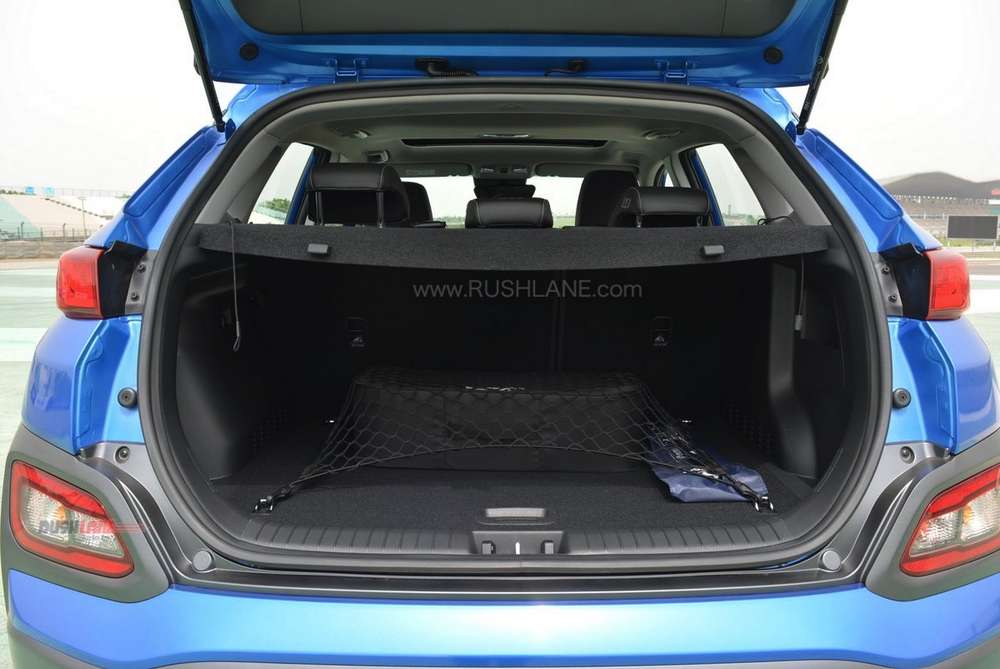
Customers will get 2 chargers, a portable charger and an AC wall-box unit. The portable charger can be used anywhere in a regular 3-pin 15 Amp socket and has a potential to add up 50km range in 3 hours of charge.The AC wall-box unit can add 50km in under 60 minutes.
Hyundai is also working upon installing Fast Charging (CCS Type – Single Port) infrastructure across the country. To begin with, it is working with IOCL to install these fast chargers in select fuel stations in Delhi, Mumbai, Bengaluru and Chennai. These fast chargers can charge 80% of the battery in an hour. In case things get out of hand and your car runs out of charge, Hyundai will still help via its Special Kona Electric fleet which will provide vehicle to vehicle charging support.
Hyundai believes in bringing in peace of mind for its customers, so it is offering a warranty for 3 years/unlimited kilometers on the car along with an 8 year/1.6 lakh km warranty on its high voltage battery.
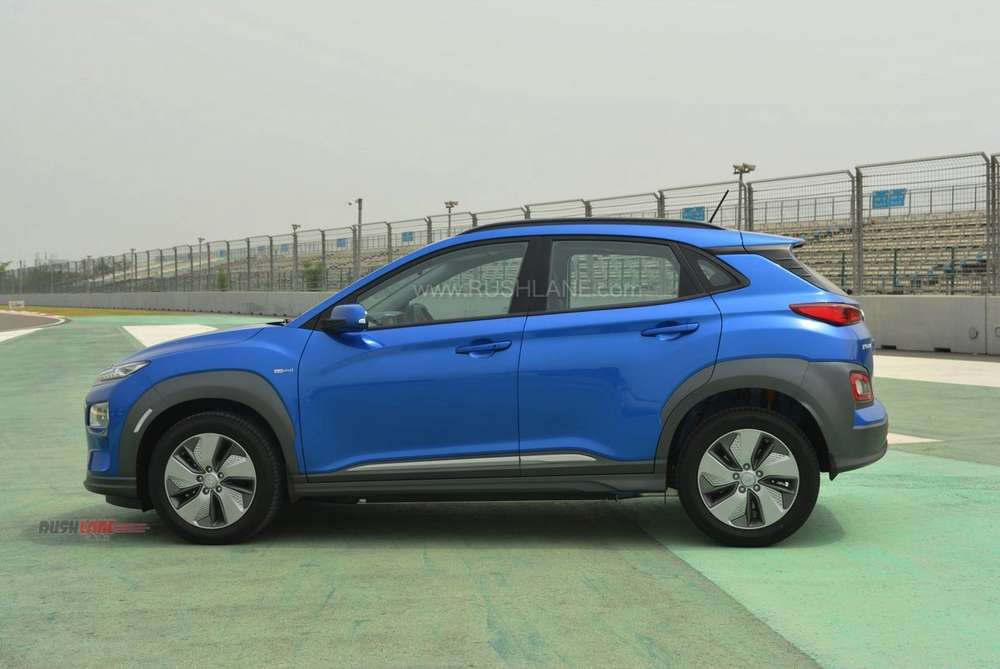
Verdict – We are glad that the Kona has finally been launched in the country. This, technically is the first EV which you can consider to be your first car and not worry about things like range, the next charging station’s location or questions like whether your car will be able to overtake that truck on the highway?
The Kona has impressed us with all the reasons it has been brought to the country for. First, the range, 452 km (ARAI certified) range is good enough for possibly all kinds of commute you will have in and around your place. You can depend on it for your daily runs and even for the occasional weekend road trip. It might disappoint you if you are planning to take it for extreme off-roading in remote locations, but if you are planning to do so, this isn’t a car for you anyway and Hyundai isn’t even considering you in its potential customer list for the Kona.
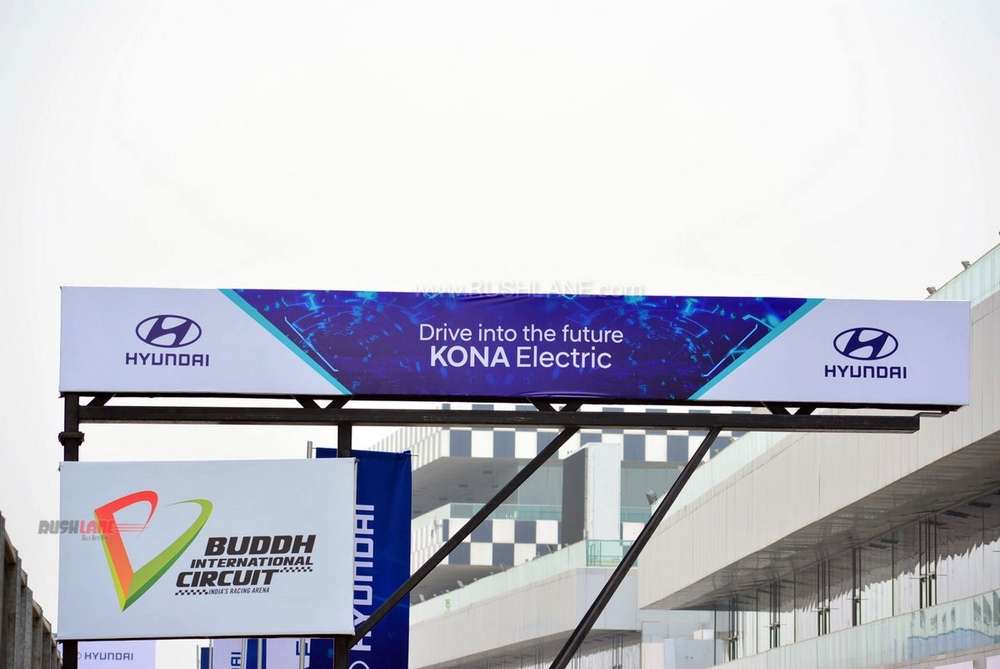
The car, unlike other EVs in the country, packs enough punch with its motor. The acceleration is splendid and so is the power delivery even in triple digit speeds. Handling usually isn’t a forte of Hyundai cars however the Kona does an overall decent job.
To sum it up, if you are ready to buy a crossover or a hatchback around the INR 20 lakh mark or above, we would say, try and stretch up that budget, factor in the savings from the Government (including the tax benefits in your income) and the lower running costs of an EV and consider to bring in the Kona to your home. What you will get is a slightly grown hatch, mentions in talk of the town and a clear conscience and environment!
Disclosure: For this review, Hyundai invited and hosted us at Noida, and paid for our travel, stay, and food.

